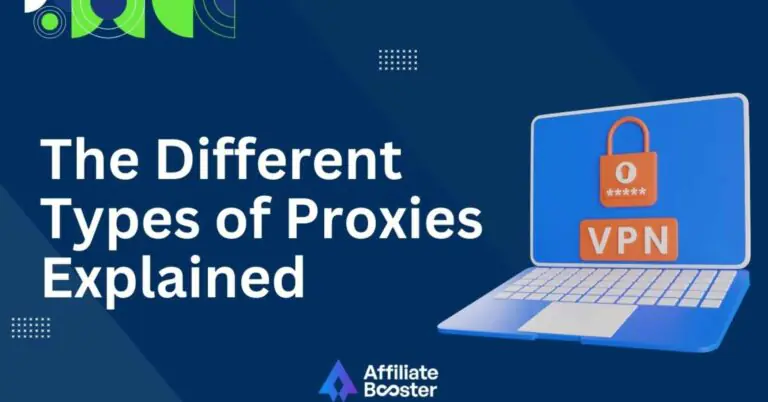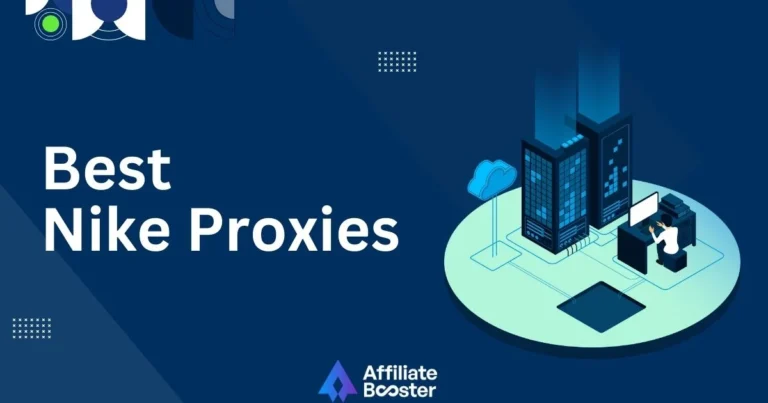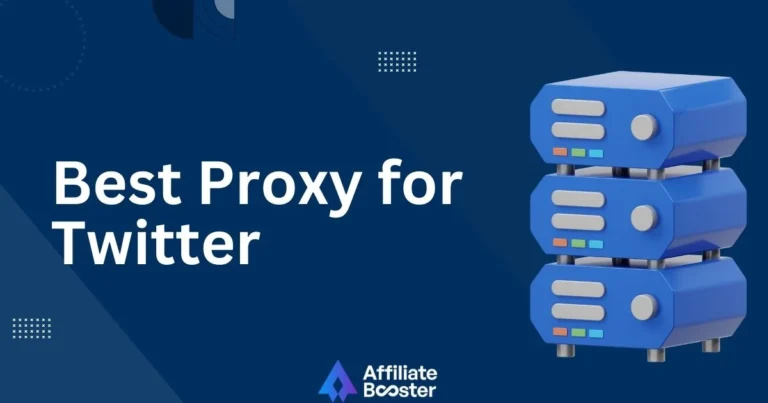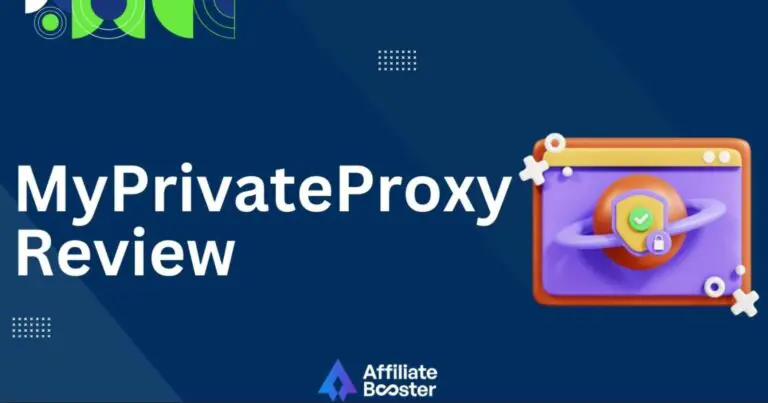Finding a trustworthy proxy service can be quite a challenge, but after hearing about PacketStream, I decided to give it a try. It’s one of the more budget-friendly options on the market, and I was pleasantly surprised by how easy it was to set up.
What makes PacketStream stand out is its unique model—you can both buy and sell bandwidth on the platform. It’s not something you see every day in the proxy world, and it definitely caught my attention. But here’s the big question: How does it perform?
In this Packetstream review, I’ll walk you through my experience with its speed, security features, and overall ease of use so you can decide if PacketStream is the right fit for your needs. Let’s get into it!
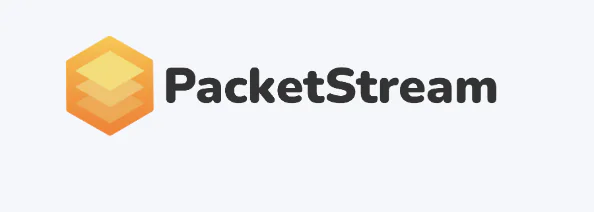
PacketStream is a peer-to-peer proxy network offering affordable residential proxies, enabling users to access geo-restricted content and conduct web scraping with ease.
- Affordable pricing
- Easy to use for beginners
- Peer-to-peer proxy network
- Offers both residential proxies
- Flexible payment options
- No minimum monthly commitments
- Smaller proxy pool compared to others
- Limited customer support
Price: $1.00 per GB
Basic Facts of Packetstream
| Feature | Details |
|---|---|
| Service Type | Peer-to-peer residential proxy network |
| Founded | 2018 |
| IP Pool | ~7 million residential IPs |
| Pricing | $1 per GB (usage), $0.10 per GB (earning) |
| Protocols | HTTP, HTTPS (no SOCKS5) |
| Targeting | Country-level only |
| Platform | Windows, macOS, Linux |
| Use Cases | Web scraping, ad verification, SEO, geo-unblocking |
PacketStream is a peer-to-peer (P2P) residential proxy network that allows users to buy residential proxies for web scraping, SEO research, and anonymous browsing.
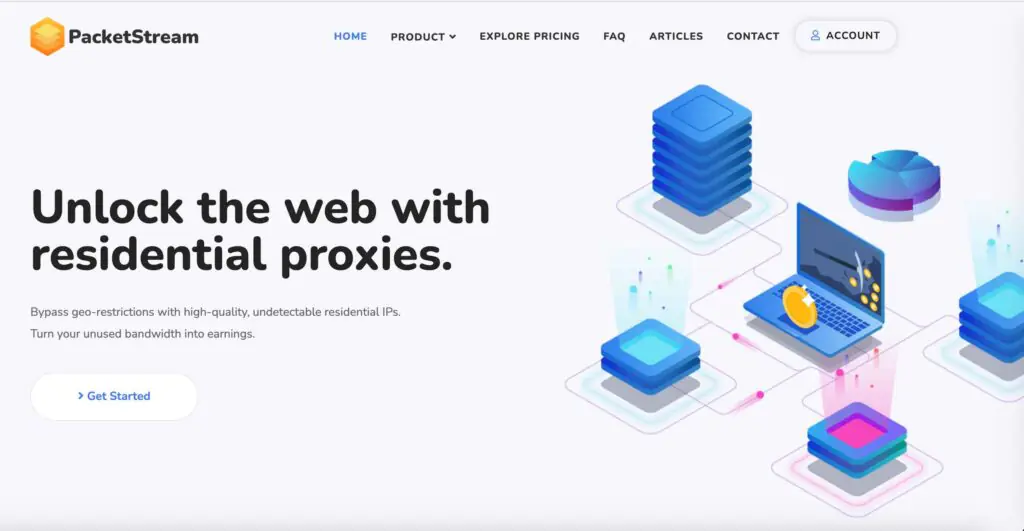
The company was launched in 2018 and quickly became known for its simple and affordable proxy services. The unique feature of PacketStream is that it not only offers proxy services but also allows users to become “PacketStreamers” and earn money by sharing their unused bandwidth.
PacketStream provides access to real residential IP addresses, making it difficult for websites to detect and block them. This makes PacketStream ideal for users who need to bypass geo-restrictions, gather data without being flagged, or browse the internet anonymously.
Proxies Offered By PacketStream
PacketStream operates through a peer-to-peer network, offering users the ability to buy residential proxies or sell bandwidth for others to use. Here's a breakdown of the proxy services provided by PacketStream:
1. Residential Proxies:

PacketStream offers access to a global network of real residential IP addresses sourced from users who share their bandwidth.
These residential proxies are highly effective for bypassing geo-restrictions and preventing detection by websites, making them a preferred option for activities like web scraping, anonymous browsing, and accessing region-locked content.
2. Bandwidth Selling (PacketStreamers):
In addition to purchasing proxies, users can join PacketStream as “PacketStreamers” by selling their unused internet bandwidth. Every gigabyte of bandwidth shared earns users money, creating a decentralized proxy network powered by users globally.
This not only allows users to earn from their excess bandwidth but also helps grow the residential IP pool that PacketStream offers.
3. Rotating Proxies:
PacketStream provides rotating residential proxies that automatically change IP addresses after a set period or after each request. This continuous rotation minimizes the risk of being detected or blocked by websites, which is essential for tasks like web scraping that require making multiple requests to a website.
4. Third-Party Integration:
PacketStream's proxies are compatible with a wide range of third-party software, such as web scrapers, SEO tools, and automation bots. After purchasing a proxy plan, users are given proxy details that can be easily configured into their preferred tools.
Who is PacketStream For?
PacketStream is best suited for a variety of users, especially those looking for affordable and easy-to-use residential proxies. Here are the key groups that would benefit from PacketStream:
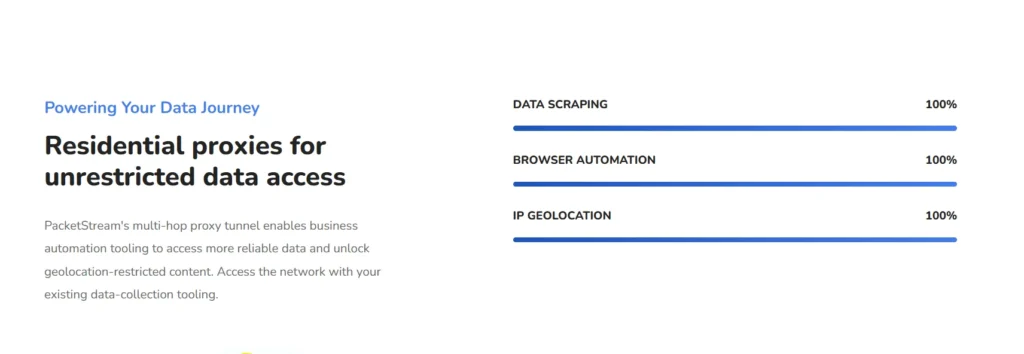
1. Web Scrapers and Data Collectors:
PacketStream is a great option for businesses or individuals who need residential proxies for web scraping or data collection. The rotating IPs help users avoid detection, allowing them to gather data at scale without the risk of getting blocked by websites.
2. SEO Professionals:
For SEO professionals who need to track search engine rankings, monitor competitors, or analyze search engine results pages (SERPs) from different locations, PacketStream’s residential proxies provide a reliable solution for bypassing search engine rate limits and avoiding IP bans.
3. Marketing Agencies:
Marketing agencies that need to access localized content or conduct market research across different regions can use PacketStream proxies to gather insights without being restricted by geo-blocks. Residential proxies from PacketStream make it easier to monitor ads, check local search results, and analyze competitor strategies.
4. Individuals Seeking Anonymity:
Individuals who prioritize online privacy or want to bypass geo-restricted content (such as region-locked streaming services) can use PacketStream’s residential proxies for anonymous browsing. Whether you’re accessing blocked websites or ensuring your data is private, PacketStream offers a secure solution.
5. Researchers:
Researchers who need to collect public data from websites for studies or academic purposes can benefit from PacketStream’s affordable and reliable proxy network. The rotating IPs help avoid detection, making it easier to gather data from multiple sources efficiently.
PacketStream – Best Features
PacketStream has several features that make it an appealing proxy service for both casual and professional users. Here are some of the key features:
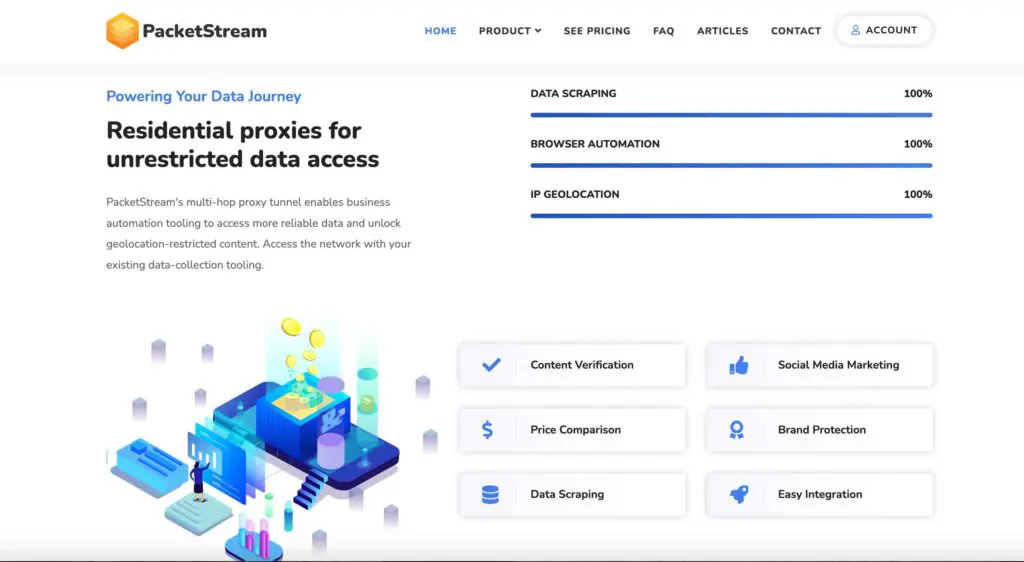
1. Residential Proxies:
PacketStream provides access to real residential IPs sourced from users who sell their bandwidth. These proxies are more difficult for websites to detect and block, making them ideal for tasks like web scraping, SEO research, and accessing geo-restricted content.
2. Rotating IPs:
One of PacketStream’s core features is its rotating IP functionality. IP addresses change automatically after each request or after a set period, which helps avoid detection and reduces the risk of being blocked by websites. This is particularly useful for users conducting large-scale data scraping.
3. Peer-to-Peer Network:
PacketStream operates on a peer-to-peer (P2P) network, which is unique in the proxy industry. This decentralized approach allows users from around the world to contribute their unused bandwidth to the proxy pool, creating a robust and diverse network of residential IPs.
In return, PacketStreamers earn money for sharing their bandwidth, which helps to grow the network continuously.
4. Easy Integration:
PacketStream is easy to integrate with a variety of third-party software, including web scraping tools, SEO tools, and bots. Once users purchase a plan, they receive proxy details that can be quickly configured into their software, allowing them to start using the proxies immediately without complicated setup processes.
5. Affordable Pricing:
PacketStream is known for its competitive pricing. Unlike many other residential proxy providers that charge premium prices, PacketStream offers affordable rates, making it accessible to small businesses, startups, and individuals who need reliable proxies but don’t want to pay enterprise-level prices.
PacketStream Pricing
PacketStream offers simple and flexible pricing for its services, allowing users to pay as they go based on their data usage. Here’s a breakdown of the pricing options:
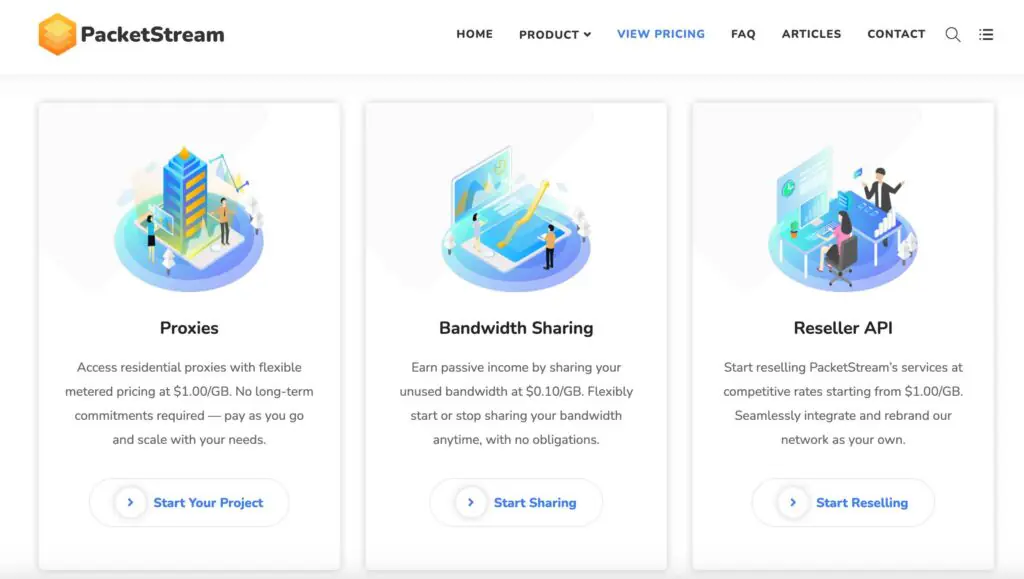
1. Proxies:
- $1.00 per GB of data used.
- No long-term commitments, and users can scale their usage as needed. The flexible metered pricing allows you to pay only for what you use, making it a cost-effective option for various tasks like data scraping, SEO monitoring, or anonymous browsing.
2. Bandwidth Sharing:
- Earn $0.10 per GB of data shared.
- Users can become “PacketStreamers” by sharing their unused bandwidth. There are no obligations, and you can start or stop sharing bandwidth at any time, making it a simple way to earn passive income.
3. Reseller API:
- Starting at $1.00 per GB of data used.
- For those interested in reselling PacketStream’s services, the Reseller API offers competitive pricing, allowing seamless integration and rebranding of PacketStream’s network. This is ideal for businesses looking to offer proxy services under their brand.
These pricing structures are designed to be flexible and accessible, making PacketStream a good option for both casual users and businesses looking for residential proxies or opportunities to resell proxy services.
Why should you go for PacketStream?
Here are the key reasons why I recommend PacketStream as a reliable proxy service:
1. Affordability:
PacketStream offers some of the most affordable residential proxy services on the market, with a pay-as-you-go pricing model of $1 per GB. This makes it accessible to individuals, startups, and small businesses that need high-quality proxies without breaking the bank.
2. Rotating Residential IPs:
The rotating residential IPs provided by PacketStream help users avoid detection and blocks, making it ideal for tasks like web scraping, SEO monitoring, and accessing geo-restricted content.
The automatic rotation of IPs ensures that requests remain anonymous and undetected, which is crucial for successful data collection.
3. User-Friendly:
PacketStream is incredibly easy to use, even for beginners. The setup process is straightforward, and integrating the proxies into popular web scraping tools, bots, and SEO tools is seamless.
The simple pay-as-you-go model also makes it easy for users to get started without complex subscription plans.
4. Peer-to-Peer Network:
PacketStream’s peer-to-peer network not only provides users with a diverse pool of residential IPs but also offers an opportunity for individuals to earn money by sharing their bandwidth. This unique feature supports the growth of the network while providing a reliable service to users.
5. Flexible Pay-As-You-Go Pricing:
With PacketStream, users only pay for the data they use, making it a cost-effective option for those who may not need proxies on a continuous basis. This flexibility makes it a great choice for occasional users or businesses that want to scale their proxy usage based on demand.
PacketStream Pros and Cons
Here’s a quick overview of the pros and cons of PacketStream:
Pros
- Affordable pay-as-you-go pricing at $1 per GB.
- Access to real residential IPs for better anonymity.
- Rotating proxies reduces the risk of detection and blocking.
- Easy integration with third-party tools and bots.
- Earn money by sharing unused bandwidth (PacketStreamers).
- Simple setup process for new users.
- Suitable for small businesses, researchers, and individuals.
Cons
- Limited advanced features for enterprise-level users.
- Speed may vary based on the quality of shared bandwidth.
Conclusion- PacketStream Review
PacketStream is an excellent choice for users looking for affordable, easy-to-use residential proxies. Its peer-to-peer model provides access to real residential IPs, making it ideal for web scraping, SEO monitoring, and anonymous browsing.
The rotating proxies and pay-as-you-go pricing model make PacketStream a flexible solution for individuals, small businesses, and researchers who need reliable proxy services without the high cost of enterprise-level providers.
While it may lack some of the advanced features that larger businesses require, PacketStream’s simplicity, affordability, and unique P2P approach make it a great option for users looking for a straightforward proxy service.
FAQs
1. What types of proxies does PacketStream offer?
PacketStream offers rotating residential proxies through its peer-to-peer network, providing access to real residential IP addresses from users worldwide.
2. Is PacketStream suitable for web scraping?
Yes, PacketStream’s rotating residential proxies are ideal for web scraping, as they reduce the risk of being blocked by websites and ensure better anonymity.
3. How much does PacketStream cost?
PacketStream charges $1 per GB of data used, following a pay-as-you-go pricing model.
4. Can I earn money with PacketStream?
Yes, by becoming a “PacketStreamer,” you can earn money by sharing your unused bandwidth with the PacketStream network.
